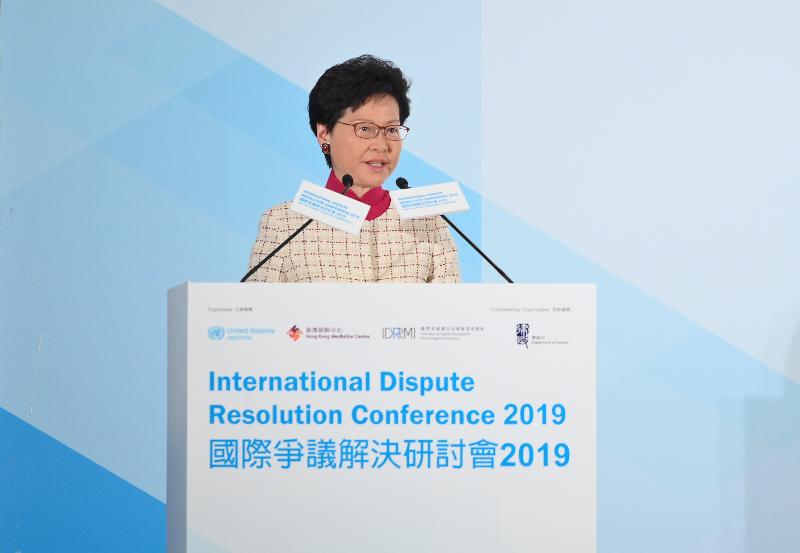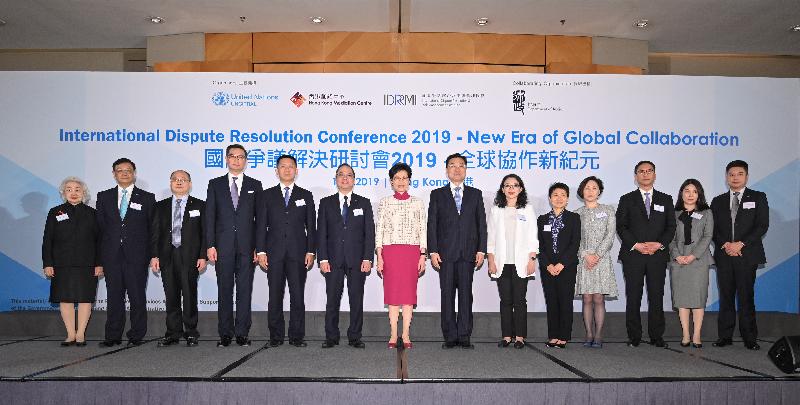Following is the speech by the Chief Executive, Mrs Carrie Lam, at the International Dispute Resolution Conference 2019 today (April 17):
Commissioner Xie (Commissioner of the Ministry of Foreign Affairs of the People’s Republic of China in the Hong Kong Special Administrative Region, Mr Xie Feng), Deputy Director General Ye (Deputy Director General of Department of Treaty and Law of the Ministry of Commerce Mr Ye Jun), Dr Law (President of the Hong Kong Mediation Centre, Dr Francis Law), the Honourable Mr Justice Poon (Justice of Appeal of the Court of Appeal of the High Court, Mr Justice Jeremy Poon), ladies and gentlemen,
Good morning. On behalf of the Hong Kong Special Administrative Region Government, I’m pleased to welcome you to today’s International Dispute Resolution Conference, jointly organised by the United Nations Commission on International Trade Law, the Hong Kong Mediation Centre and the International Dispute Resolution and Risk Management Institute. Given our status as a leading international dispute resolution centre in Asia Pacific, I believe that Hong Kong is indeed the ideal location for this event, which brings together 500 professionals from various sectors to exchange ideas on the settlement of disputes.
The theme of today’s conference is “New Era of Global Collaboration”. It is a timely theme, for we need global collaboration more than ever to tackle the daunting challenges faced by the world. Uneven growth, diverging trade policies, financial instability and trade and investment disputes are rife worldwide. Indeed, the United Nations 2019 World Economic Situation and Prospects report notes that last year saw an upswing in trade tensions and a steep escalation in the number of disputes raised under the dispute settlement mechanism of the World Trade Organization. Beyond the more visible trade disputes, climate change and biodiversity challenges all call for global solutions.
An increase in international trade and investment disputes seems to be inevitable given the growth in cross-border economic activities and transactions, especially in Asia. Buoyed by domestic demand, Asia’s GDP is expected to grow 6.1 per cent a year on average between now and 2023. Hong Kong is taking full advantage of that growth. Nine of our top 10 trading partners are from Asia, and they accounted for almost 80 per cent of our merchandise trade in 2017. Given the Free Trade Agreement and related Investment Agreement between Hong Kong and the ASEAN, which were signed in 2017 and are expected to come into force later this year after the necessary ratification process, trade and investment in this region are bound to flourish in the years and decades to come.
Hong Kong, as a founding member of the World Trade Organization and a staunch supporter of free trade, would no doubt welcome trade growth. The key is to manage and settle the increasing number of disputes that come with it. In this regard, conventional litigation alone will not prove sufficient. Arbitration, given its established international conventions, rules and norms, has long been used to settle international disputes. And mediation is gradually sharing arbitration’s spotlight in international dispute resolution. Mediation’s attractions are many. It works to achieve an amicable resolution, given that settlements must be reached voluntarily. And that, of course, is conducive to maintaining business relationships among the parties involved.
That said, the lack of an effective method for enforcing mediated agreements has been an impediment to its international development. In that regard, I am pleased to note the approval, last year, of the Convention on International Settlement Agreements Resulting from Mediation and its subsequent adoption by the United Nations General Assembly. The Mediation Convention, with its enhanced enforceability, is expected to boost mediation, particularly investment mediation, as a global means of dispute resolution.
Hong Kong is actively preparing for that reality, providing dedicated training for investment mediators. The first Investment Law and Investor-State Mediator Training in Asia took place here last October. More than 50 dispute resolution practitioners and government officials from Asia and beyond took part.
As an international legal and dispute resolution services centre in the Asia Pacific region, Hong Kong will continue to follow closely the development on international mediation and arbitration, while embracing the immense opportunities that may emerge. Thanks to our “one country, two systems” framework, Hong Kong maintains our common law system, underpinned by an independent judiciary and a deep and varied pool of legal practitioners from all over the world. Hong Kong’s judicial independence is recognised internationally and is ranked eighth among 140 economies. According to World Bank’s World Governance Indicators, Hong Kong’s percentile ranking in the rule of law has improved from 70 per cent in 1996 to 94 per cent in 2017, showing that the rule of law in Hong Kong has continued to improve over the years. Let me add that 14 eminent judges from other common law jurisdictions, including Australia, Canada and the United Kingdom, currently sit on our Court of Final Appeal as non-permanent judges, which in itself is a testimony to our rule of law and independent judiciary.
Our economic system is no less attractive. We maintain a free-market economy, offering a simple and low tax regime and a level playing field for companies. The Heritage Foundation has named Hong Kong the world’s freest economy for the past 25 years in a row. The Fraser Institute also ranks us consistently the first in economic freedom.
Those are our traditional strengths, and we are also developing new ones. In particular, innovation and technology is a policy priority of my Government, and Hong Kong is catching up quickly on that front. We are encouraging the application of technology in almost every aspect of our economy and society, including justice for cross-border disputes. A representative from our Department of Justice is chairing a Working Group in the Asia-Pacific Economic Cooperation (APEC), which has developed a framework for the online resolution of cross-border, business-to-business disputes. It will cut costs and overcome the geographical distance between parties involved. It will also promote the use of dispute-resolution services internationally.
To support APEC’s work, non-governmental organisations here are creating an electronic Business Related Arbitration and Mediation system, or eBRAM in short. eBRAM is being developed as a secure and cost-effective deal-making and dispute-resolution online service for cross-border commercial and trade disputes, including those relating to projects under the Belt and Road Initiative. My Government is providing close to US$20 million to support eBRAM’s development and initial operation. We hope that eBRAM could facilitate business operation and achieve better access to justice by providing easily accessible and affordable dispute resolution services. We also hope that it could demonstrate Hong Kong’s unique competitiveness under the “one country, two systems” principle in addressing the service need of various jurisdictions with different legal traditions.
In short, ladies and gentlemen, Hong Kong is determined, and my Government is committed, to Hong Kong’s continuing rise as centre for international legal and dispute-resolution services. We look forward to your support.
Before I close, my thanks to the United Nations Commission on International Trade Law, the Hong Kong Mediation Centre and the International Dispute Resolution and Risk Management Institute for organising this important conference. I wish each and every one of you a rewarding day at the conference and here in Hong Kong, Asia’s world city. Thank you very much.





